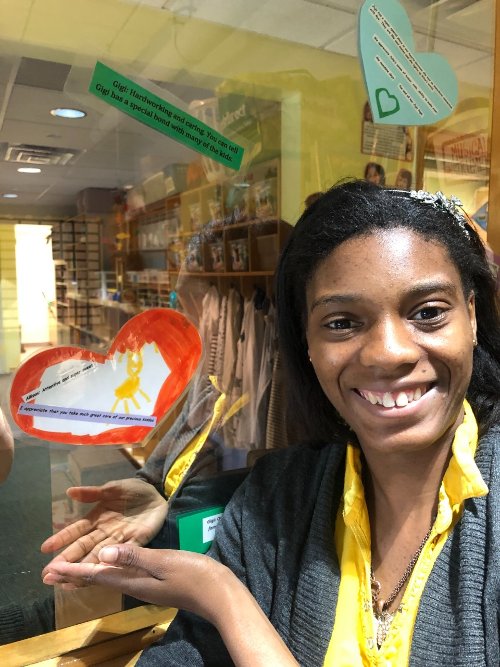Focusing on Early Child Educationat Work and in Grad School
July 11, 2019

Allison Gaylock '17 is balancing grad school with her work as an infant teacher at CP Kids Daycare and Preschool in New York City’s Chelsea neighborhood, taking care of children and helping them work on developmental milestones.
Allison Gaylock ’17 of Brooklyn, N.Y., is currently in grad school—and working as an infant teacher while she earns a degree in infant and family development/early childhood education.
A math major at MCLA, Gaylock has one more year to go until she graduates from the Bank Street College of Education in New York City. Her school schedule—classes mostly evenings and afternoons--lines up nicely with her work as an infant teacher at CP Kids Daycare and Preschool in New York City’s Chelsea neighborhood, where she works during the day, taking care of children and helping them work on developmental milestones.
As she looked at grad school options, “I thought it would be interesting to learn more about infants and toddlers—and I hadn’t heard of many programs that catered to that age group,” she said. Bank Street’s curriculum “is very research-based,” she said, “it works out because at work, I apply it in a lot of ways.”
The children Gaylock works with are three months to 18 months—an interesting time for child development indeed. Aside from the basics of child care—feeding, naptime, trips to the park, etc.—Gaylock tracks childrens’ progress so it can be shared with parents. Babies lose their newborn reflexes after three months and become more communicative and start imitating sounds they hear; at 12 months, they begin standing on their own, exploring their environment, and develop their reflexes.
“You need to have applied skills…It’s not just babysitting. You are helping them learn and grow,” she said. “In the first three years, you see a lot of growth and development—it’s interesting to work with children on new milestones and see them adjust to their environment.”
Gaylock is using mathematics and research skills she honed at MCLA as she learns more about child development theories and studies. “Whenever a child reaches a milestone, we say, ‘OK, how can we do better?” she said of her work. She is a proponent of introducing math early on—“teaching simple math skills at an early age really does help in the long run,” she said.
Skill-building for younger children is a hot topic in NYC right now; less than half the students in New York City public schools met state proficiency standards for math and reading in 2017-18. Just 42.7 percent of city public school students met standards on math, specifically—so those early lessons may make a huge impact for children later on. “In New York state, too, math is really lacking,” Gaylock said. “I do shout out MCLA’s math department in my graduate classes.”
The most important thing for parents to remember? “All children are different,” says Gaylock. It’s alright if those milestone lists come at a child’s own pace, but it’s important to know your child’s strengths and limitations as well. “If you feel like your child isn’t doing something they should be (at their age), don’t be afraid—reach out and talk to your child’s teacher,” she said.
***
Are you an MCLA student, alumni, or faculty member? Do you want MCLA to share your story? Please email Creative and Brand Strategy Manager Francesca Olsen at Francesca.Olsen@mcla.edu.
